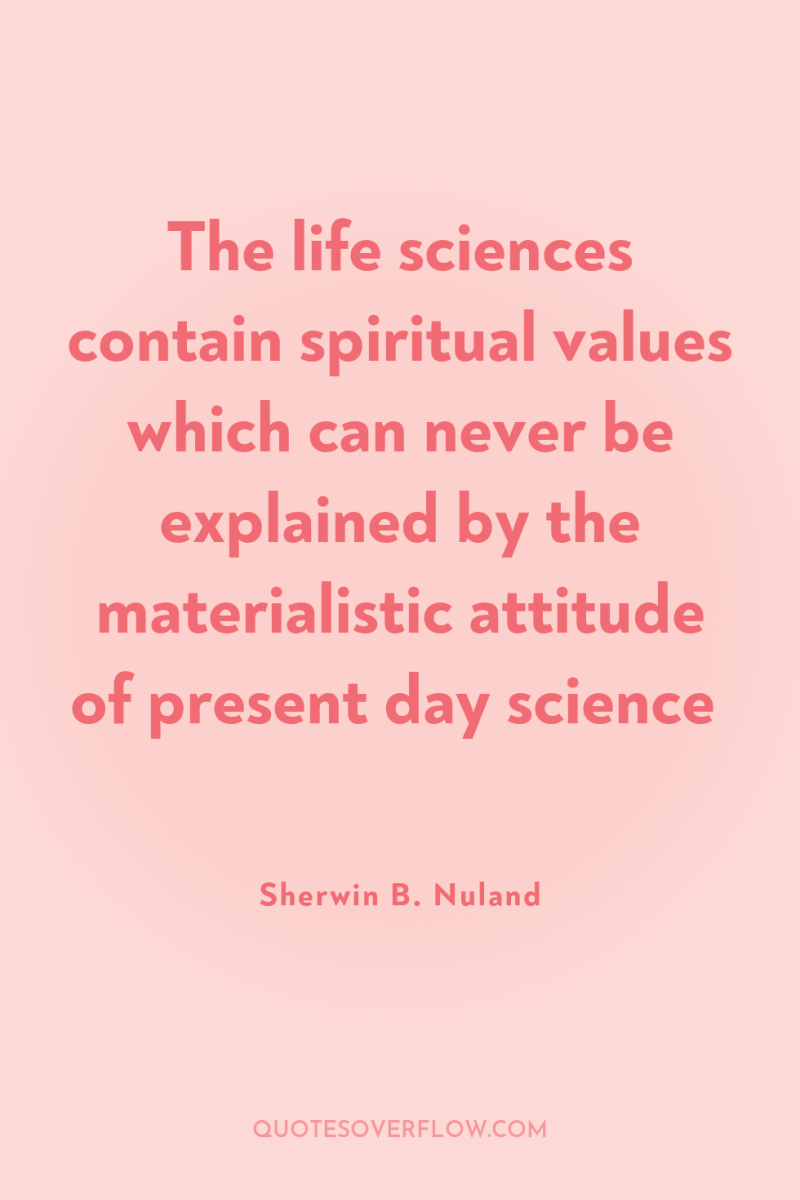
The life sciences contain spiritual values which can never be explained by the materialistic attitude of present day scienceSherwin B. Nuland
That enormously complex biological interactions are so flawlessly coordinated as to result in such obvious manifestations as human thought or the electrical activity that dries the heartbeat is as exciting to me -- actually more exciting -- than such phenomena were when I was a small boy and thought them divinely (in the supernatural sense) driven.Sherwin B. Nuland
My mother died of colon cancer one week after my eleventh birthday, and that fact has shaped my life. All that I have become and much that I have not become, I trace directly or indirectly to her death.. In my professional and personal life, I have lived with the awareness of death's imminence for more than half a century, and labored in its constant presence for all but the first decade of that time.Sherwin B. Nuland
Moths and flames, mankind and death--there is little difference.Sherwin B. Nuland
Death with dignity" is our society's expression of the uniÂversal yearning to achieve a graceful triumph over the stark and often repugnant finality of life's last sputterings. But the fact is, death is not a confrontation. It is simply an event in the sequence of nature's ongoing rhythms. Not death but disease is the real enemy, disease the malign force that requires confronÂtation. Death is the surcease that comes when the exhausting batÂtle has been lost. Even the confrontation with disease should be approached with the realization that many of the sicknesses of our species are simply conveyances for the inexorable journey by which each of us is returned to the same state of physical, and perhaps spiritual, nonexistence from which we emerged at conception. Every triumph over some major pathology, no matter how ringing the victory, is only a reprieve from the inevitable end. .Sherwin B. Nuland
..my patient needed a great deal of reassurance that there had been nothing unusual about the way her mother died, that she had not done something wrong to prevent her mother from experiencing that "spiritual" death with dignity that she had anticipated. All of her efforts and expectations had been in vain, and now this very intelligent woman was in despair. I tried to make clear to her that the belief in the probability of death with dignity is our, and society's, attempt to deal with the reality of what is all too frequently a series of destructive events that involve by their very nature the disintegration of the dying person's humanity. I have not often seen much dignity in the process by which we die. .Sherwin B. Nuland
In the community of living tissues, the uncontrolled mob of misfits that is cancer behaves like a gang of perpetually wilding adolescents. They are the juvenile delinquents of cellular society.Sherwin B. Nuland
Though everyone may yearn for a tranquil death, the basic instinct to stay alive is a far more powerful forceSherwin B. Nuland
I never had a conscious fear of death, but I did have a conscious fear of sickness. By the time I completed medical school, that fear was gone.Sherwin B. Nuland
Not death but disease is the real enemy; disease, the malign force that requires confrontation. Death is the surcease that comes when the exhausting battle has been lost.Sherwin B. Nuland
Cancer cells are fixed at an age where they are still too young to have learned the rules of the society in which they live. As with so many immature individuals of all living kinds, everything they do is excessive and uncoordinated with the needs or constraints of their neighbors... they are reproductive but not productive.Sherwin B. Nuland
Even putting aside the Judeo-Christian morality upon which the Constitution and our nation's culture are based, the notion of forced euthanasia would contradict the long-held body of medical ethics to which all American doctors must adhere.Sherwin B. Nuland
The growing professional disciplines of medical ethics and bioethics have had a profound impact on researchers, bedside doctors, associations of physicians, and government.Sherwin B. Nuland
Every hope of successive generations of scholars that order might be constructed from the chaotic mess of medical nomenclature has been frustrated. Even diseases recognized in the same historical period have been given names based on characteristics that have no relation to one another, and thus no common criteria.Sherwin B. Nuland
Long regarded as central to the contemporary understanding of medical ethics are four principles that must be satisfied in order to fulfill the requirements of moral decision-making. These principles are autonomy, justice, beneficence, and non-maleficence.Sherwin B. Nuland
Medical judgment can be taught - laboriously, in long periods of training - but it cannot be neatly handed over as the occasion demands it. It is the irreplaceable and untransferable contribution that the healer makes to the suffering individual who would be healed.Sherwin B. Nuland
The writings and the recommendations of the earliest medical scientists and the new breed of clinicians between the mid-fifteenth and early seventeenth centuries were based on the supposition that sufficient study and experimentation would elucidate not only the origins of disease, but its treatment as well.Sherwin B. Nuland
By the time of my ninth birthday, I had become a bit of a socialist, as I am said by conservative colleagues to be to this day. I went on within the next few years to volunteer as an envelope stuffer for the American Labor Party, and my political thinking has not shifted measurably since that time.Sherwin B. Nuland
We have had a rewarding relationship, the belly and I.Sherwin B. Nuland